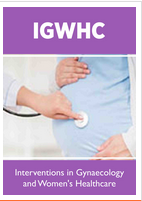Obstetrics & Gynecology Journals-Lupine Publishers
Biophysical Biomarkers of The Fertile Window inSub-Fertile Women: Individual Approach by
Murcia Lora JM in IGWHC in Lupine Publishers.
Murcia Lora JM in IGWHC in Lupine Publishers.
The American Society for Reproductive Medicine has defined
the length of the fertile period when the first day oestrone-3-
glucuronide (E3G) is detected in urine, to the second day after the
luteinizing hormone (LH) peaks. This period usually varies between
7 days in fertile people [1]. Actually, most studies define the period
of greatest fertility since six days before ovulation until one day
after ovulation. The change from infertile days to the most fertile
days in the follicular phase of the menstrual cycle occurs during
this interval, which is determined by the gradual development of
the dynamic follicular progress of the ovulation [2,3]. This interval
is different among sub-fertile couples; however, a good correlation
also has been observed between biomarkers, at the beginning,
and the end of the fertile period in cycles of sub-fertile women
with regular and irregular menstrual periods, without specific
pathology [4]. The decision to detect the fertile window in subfertile
patients depends on the spontaneous pregnancy possibilities
proven effectiveness [5]. In sub-fertile couples, the fertile window
length varies, from the first day of normal sperm-mucus interaction
to the ovulation period. The objective of this cases-study focused
primarily on couples in order to increase the efficiency in the
estimating of the time-specific of the fertile window to help to
improve pregnancy probabilities.To know more click on below link.
For more Lupine Publishers Open Access Journals Please visit our website: http://www.lupinepublishers.com/
For more Obstetrics & Gynecology Journals articles Please Click Here: https://lupinepublishers.com/gynecology-women-health-journal/
For more Obstetrics & Gynecology Journals articles Please Click Here: https://lupinepublishers.com/gynecology-women-health-journal/



Comments
Post a Comment